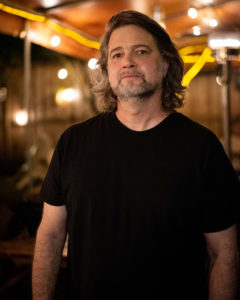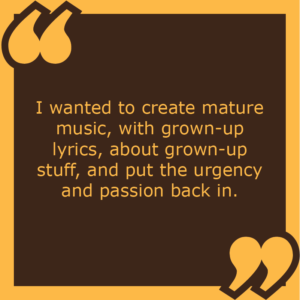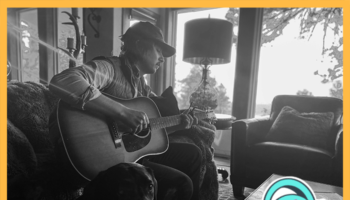
Singer-songwriter John Shipe traveled through darkness to find the light, a theme that permeates his latest album, the double-sized The Beast Is Back.
“Personal reckoning leads not only to being a better person, but to better art,” said Shipe in an exclusive interview with TrunkSpace. “My writing now meets the listener in some of the most personal places. Fortunately, with age comes the humility to let this happen.”
While the album isn’t due until September 25, the Portland-based Americana artist’s latest single, “Love Ain’t Easy,” is available now.
We recently sat down with Shipe to discuss art worth sharing, the maturity of social media in music, and writing for grown-ups.
TrunkSpace: You have a new DOUBLE album due out in the near future. What kind of emotions do you juggle with when releasing new material to the masses, and is the experience different this time around given that the entire world, essentially, is ground to a halt?
Shipe: So much happens in the world between the day you go into a studio with 18 songs, and when you emerge a year later with your hopeful masterpiece. Race issues exploding. Pandemic. Our damaged national psyche. People in real economic trouble. I picked a hell of a time to do this. None of the personal self-involved, self-directed anxieties I’ve experienced in the past apply. And that’s a good thing. There is more at stake in America than the comings and goings of singer-songwriters. (This takes me back to when I started a tour the morning of September 11th, 2001, when the Trade Towers went down. It was difficult to muster up the energy to self-promote.) You press pause, and you ask some hard questions. Those questions aren’t just about the timing of the business at hand, or even the quality of the product. They’re about the fundamental meaning of the project. Artists aren’t entitled to an audience, so, are we offering up something worth sharing? We seriously considered these questions, and we changed our choice of debut single, in fact. But I feel good about how the material relates, and that it’s universal. Some of the stuff I was making 20 years ago might be awkward to put into the world right now. But as an older, wiser artist, there’s more humility and humanity than in my previous work. Not so nakedly ambitious and idiosyncratic.
TrunkSpace: Normally you would tour to support a new release, but that is not something that is possible in every state right now. How has promoting the upcoming album changed? How do you get the word out when people can’t get out themselves?
Shipe: I recently joked to a friend and colleague, that as a “comeback artist,” without the channels of commercial success at my disposal, my music career might be on Facebook. And now, everybody’s career is on Facebook (and Instagram, and Twitter). As an optimist, I can’t help seeing some beauty in this. The intimidating inertia of Music Industry has been interrupted. And we’re all in this together, famous and unknown alike. Not that the playing field has been totally leveled, but a spirit of generosity, sweeping through the Biz, encourages artists to LiveStream, post, tweet, and blog abundantly. (Independent press is more generous than when I was cutting my teeth in the ‘90s.) Social media used to be superficial promotion – an impersonal shill for music you could purchase, or shows you could attend. But now, blogs and posts are part of my art. I treat them as the substance of what I might have to offer, as an artist, with something of value to share. The ideas, the writing, and the message I put out there deepen my relationship with fans and potential fans. (Especially with regard to the fragile times we live in.) The limelight is nowhere and everywhere. And competition for it has been removed as a source of anxiety. Artists’ fans are literally right there in the palm of their hands at any given moment. And we ought to take good care of that relationship. As for live shows, I’ll admit I’m extremely frustrated not being able to play a hundred gigs out of the gate. But I’m still digging deep and giving it out as thoroughly as I can in a virtual, digital way, which can also be sufficiently intimate. When you can’t play any shows, social media presence becomes the very product of your creativity. It’s like “The Wizard of Oz.” The man behind the curtain is now a main character, and he’s just as interesting as the formidable Wizard with the lights and the flames and the smoke.
TrunkSpace: You have said that this is the album of your life and that you might not make another one because you may not have anything left in you. Are you someone who has to step away from music after creating in order to refuel the emotional tank? Did you feel like you were running on empty after putting this one to tape?
Shipe: It’s tough to talk about this (because it relates to alcohol recovery). It’s a well-informed question, because that’s the way art works. You drain the well; then it takes a minute to fill the well. For 10 years prior to Beast, my emotional tank was overflowing wildly. But I was in no condition to perform the task of making a good record. (Addiction, recovery, and various disorienting life stuff.) My supportive partner helped me get back on track. And my producer, Tyler Fortier, navigated the project via a path of total vulnerability. So, I put it all out there like a year-long breakthrough therapy session, completely hollowing myself out. The good news is, the well fills back up faster than expected, ’cause I emptied out all the stifling, counter-productive sludge. Maybe “the well” metaphor doesn’t work anymore. I’m healthier now, by virtue of the process, and I feel like I could make another album sooner than later. Hopefully, from here on out, creativity won’t be a boom-and-bust cycle.
TrunkSpace: If someone sat down to listen to the album front to back, what would they learn about you both as an artist and as a person?
Shipe: They would think I am melodramatic, with dark pessimistic thoughts, which I use a combination of determination and humor to overcome. They’d imagine that I have experience with the corroding power of secrets poorly kept. And I’ve learned that it’s safer to face things head-on than to hide. I hope I make it clear that it’s worth the trouble. I hope they would find me empathetic and compassionate, about even the toughest stuff.
As an artist and musical craftsman, I don’t ponder my place in the “State of the Art.” I’ve never had a “mission,” so to speak, with respect to any particular aesthetic, or self-consciousness about how I fit my genre. But I have an inkling of what I’m up to: putting edgy passion into grown-up music. It seems like the musical intensity of older artists wanes in direct proportion to the spirit of resignation in the average aging adult’s life outlook. Grown-up music seems removed and deflecting. Intense, invested music seems reserved for young people experiencing everything for the first time. Falling in love for the first time. Breaking up for the first time. (Feels like the end of the world.) Challenging authority for the first time. A young man’s first existential angst troubles the soul. But the music of grown-ups can be so calm and dignified, like mature, stable family life. This does not make sense to me. For grown-ups, there’s so much more at stake. Where is the proportional musical outlet for the depths of the adult experience? If grown-ups can get so worked-up with outrage, loss and confusion that they’ll vote for a man like Donald Trump, or protest in the streets against a man like Donald Trump, maybe they’re open to music that’s just as melodramatic. A break-up of a long marriage really is the end of the world. Existential angst in middle-age is truly psychologically-dangerous, not a mere pose. Successful romance later in life is salvation for real. I wanted to create mature music, with grown-up lyrics, about grown-up stuff, and put the urgency and passion back in. (“My Daughter, My Love,” is about a father who’s losing his teenager’s affection. I imagined the pain of that rejection being tougher on him than any of his failed romances. So I made it like a wrenching break-up song.)
TrunkSpace: You went all in on the writing and took a “brutal honesty” approach. We already talked about what others would learn in listening to the album, but what did YOU learn about yourself in creating it?
Shipe: It was a great relief to find that I still have what it takes to see a project through, to stay in command of my craft, and meet the expectations of my collaborator. That was a positive. But I was humbled to discover the degree to which my previous work had kept my vulnerability on a leash, in contrast to the honesty on this album. When I was younger, I willed myself to be a deep thinker, a profound writer, and an earnest performer. But it was sort of a role that I played on the outside, while I held a lot back on the inside. I played it well-enough to make 10 albums of varied quality, but something was missing. In retrospect, I was not gifted with a huge imaginative intellect; I just work very hard to cultivate one. For this album, I stripped away all the artifice and defensiveness. It really dovetails with addiction recovery. Personal reckoning leads not only to being a better person, but to better art. My writing now meets the listener in some of the most personal places. Fortunately, with age comes the humility to let this happen.
TrunkSpace: What are you most proud of with the album?
Shipe: Three things: 1) My slide guitar playing. It’s the only thing I do well enough as a player that might get me hired as a sideman. 2) I put myself in the hands of my producer, Tyler. On his roster of artists, I’m one of the more cooperative – not difficult or stubborn. This doesn’t come easy for the average songster, but that’s how you make a good album. 3) Tyler and I know for sure that we did our best. We held nothing back and leaned into all the passion possible within the grown-up conventions of the Americana genre.
 TrunkSpace: We have all been in some form of lockdown for the majority of 2020. How much of your time spent social distancing has also been spent creating? Have you experienced a creative jolt during this period – and will it lead to another album?
TrunkSpace: We have all been in some form of lockdown for the majority of 2020. How much of your time spent social distancing has also been spent creating? Have you experienced a creative jolt during this period – and will it lead to another album?
Shipe: As we speak, Tyler and I are working on a single I wrote called “A Song About This.” It’s about the artist’s responsibility to say something, anything, when faced with our country being torn apart. We plan to release it in September. Meanwhile, I have all this time to work on my act – doing new things on the guitar and adding piano – it’s a welcome surprise that I continue to improve and discover new musical dimensions even after many plateaus. I write a little something every day, so I will be recording again in the spring of 2021 if I’m not touring.
TrunkSpace: Where are you hardest on yourself as an artist and how do you overcome those self-critical insecurities?
Shipe: Every artist has stretches of self-doubt. We deny our talents, even though we have proven bodies of work. Charlie Chaplin used to say, “Any minute now, I’ll be exposed as a fraud who’s just making it up as he goes along.” It often happens after a noticeable success. It’s just panic – the pressure of measuring up to the standards you set for yourself in the release of your own work. “Oh, God, now I gotta live up to the hype.” I’ve recently come to realize that this doesn’t make a damn bit of sense. I’m lucky to have supportive colleagues, collaborators, friends and fans – all shameless enablers – who won’t let me doubt without reprimand. When people openly enjoy your songs, it’s disrespectful to implicate your audience as foolish for rooting for you. That said, I confess that I worry about flaws in my singing voice, sloppiness in my guitar playing, and pretentiousness in the lyrics. But I had a nice colleague remind me that it’s all a function of my willingness to take risks. So I just push on. I practice and write constantly, like clockwork. Songwriting is a compulsion – or, better, a meditation – and I can’t really stop. It scratches the deepest itch. I have a thousand yet-to-be-completed songs to keep me company. Something creative is always on the docket. I don’t have time to doubt it.
TrunkSpace: If you sat down with your 10-year-old self and gave him a glimpse of his future, would he be surprised by where his musical journey has taken him thus far?
Shipe: My childhood self would be delighted to hear about seeing the whole country from a touring van, playing big stages, opening for famous bands, and visiting National Parks every chance along the way. But I’d have to warn him about the inner stuff that would drive him to keep it going as a struggling solo artist, in a kind of “second adulthood” after the fun was over. He’d wonder what the payoff will be. And I’d have to tell him just to trust it. It’s gold, but you have to dig deep for it. There would come an abundance of collaboration, a decent body of work and a continued welcome in the Biz, in spite of experiencing so many supposed failures.
TrunkSpace: Time machine question. If you could jump ahead 10 years and get a glimpse of what your career looks like a decade from now, would you take that journey? If not, why?
Shipe: I’m still getting better at what I do. I’m re-connecting with musical friends & colleagues, and I have much more to offer. So, yeah, come 2030, I wanna look back on another decade (my 4th), of satisfying collaborations, and my best work.
Shipe’s latest single, “Love Ain’t Easy” is available now. The album, The Beast is Back, is due September 25.






